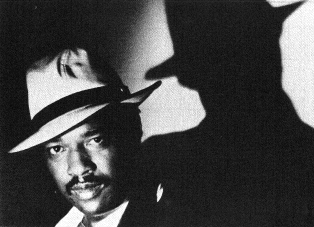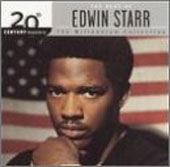|
In 1962, Edwin hit the road as a featured singer with the band of Bill Doggett. Over the next few years, Edwin learned the ropes of the recording industry and wrote the song that was to become his first hit single. In 1965, he left the Doggett band and signed as a solo artist with Ric Tic Records. His debut disc became a good seller and led to his early nickname: "Agent Double-O-Soul." The next year, he found a vocal quartet, the Shades of Blue, and wrote and produced their biggest hit, "Oh How Happy."
After a while, Ric Tic was bought out by Motown Records. Edwin became a part of the Motown family and was assigned to the Gordy Label. In 1969, he entered the national Top 10 for the first time with "Twenty-five Miles," a soul stomper he wrote back in his Cleveland days. Edwin was rising fast, and he knew that the coming decade would bring him his greatest popularity ever. In 1970, Edwin began work with one of Motown's finest writers and producers, Norman Whitfield, who had been responsible for the continuing success of the Temptations. It was Norman and composer Barrett Strong who came up with perhaps the label's most controversial hit single ever. "'War' was originally recorded by the Temptations," recalled Edwin. "It was buried on one of their albums. But then a lot of mail came in, mostly from students, asking why they didn't release it on a 45. Well, that was a touchy time, and that song had some implications. It was a message record, an opinion record, and stepped beyond being sheer entertainment. It could become a smash record, and that was fine, but if it went the other way, it could kill the career of whoever the artist was."
"Nobody really understood what we were talking about on that song," he continued. "It wasn't about Vietnam. It never once mentioned the war in Vietnam. It just so happened that, at the time, the war was going on, and the words just lent themselves to the occasion. Actually, we were talking about a war of people -- the war people wage against each other on a day-to-day basis. All the words are applicable to neighbors who fight with each other, you know, 'War, what is it good for?' That's what the song was about, at least for me." "War" became a political anthem in 1970 and soared to number one during the long, hot summer. It sold more than three million copies and earned a Grammy Award nomination for best Male Rhythm and Blues Vocal Performance. "Afterward, I recorded another song called 'Stop the War Now.' I didn't like that song. I thought it was much too similar. I tried to say, 'Hey, let's go another way completely,' but I didn't have much say in the matter. I have always contended that that was part of the reason I fell off the charts. You see, Motown did the formula many times. They'd do 'I Can't Help Myself,' and then come right back with 'The Same Old Song,' with the same sound but different lyrics." Edwin finally left Motown in the mid-seventies, frustrated at being unable to come up with another hit. In later years, he recorded for Granite and 20th Century Records. Sales were small, but at least there was a kind of satisfaction. "I'm back now in the soul vein," he said proudly in the early eighties. "Back in the bag I was in with 'Twenty-five Miles' and 'Agent Double-O-Soul.' I write for myself and produce myself. As far as I'm concerned, the 'war' is over, and I thank God for that." After cutting a comical commentary song "Tired of It" for Montage Records in the early eighties, Starr moved to England, where he found a more receptive audience (singles he recorded for 20th Century-Fox had been Top 10 hits in the U.K.). He had a hit with "Whatever Makes Our Love Grow," a late eighties single he cut with the techno-pop production team Stock/Aitken/Waterman. Starr also appeared onstage with Bruce Springsteen, who made "War" a staple of his live shows during the eighties. Starr died of a heart attack at his home in Nottingham, England, on April 3, 2003, at the age of 61 as "Operation Iraqi Freedom," the first major war of the twenty-first century, was drawing to a climax in the Middle East. Timely as ever, Starr's ravaged version of "War" received renewed airplay in the wake of his death.
No comments so far, be the first to comment. |


